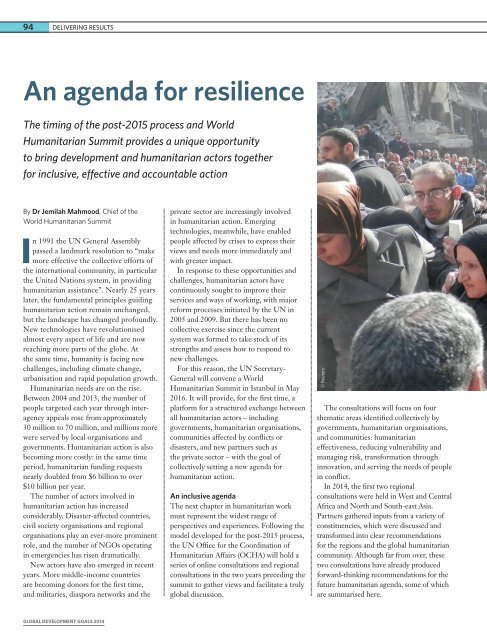FAMBB
FAMBB
FAMBB
Create successful ePaper yourself
Turn your PDF publications into a flip-book with our unique Google optimized e-Paper software.
94 DELIVERING RESULTSAn agenda for resilienceThe timing of the post-2015 process and WorldHumanitarian Summit provides a unique opportunityto bring development and humanitarian actors togetherfor inclusive, effective and accountable actionBy Dr Jemilah Mahmood, Chief of theWorld Humanitarian SummitIn 1991 the UN General Assemblypassed a landmark resolution to “makemore effective the collective efforts ofthe international community, in particularthe United Nations system, in providinghumanitarian assistance”. Nearly 25 yearslater, the fundamental principles guidinghumanitarian action remain unchanged,but the landscape has changed profoundly.New technologies have revolutionisedalmost every aspect of life and are nowreaching more parts of the globe. Atthe same time, humanity is facing newchallenges, including climate change,urbanisation and rapid population growth.Humanitarian needs are on the rise.Between 2004 and 2013, the number ofpeople targeted each year through interagencyappeals rose from approximately30 million to 70 million, and millions morewere served by local organisations andgovernments. Humanitarian action is alsobecoming more costly: in the same timeperiod, humanitarian funding requestsnearly doubled from $6 billion to over$10 billion per year.The number of actors involved inhumanitarian action has increasedconsiderably. Disaster-affected countries,civil society organisations and regionalorganisations play an ever-more prominentrole, and the number of NGOs operatingin emergencies has risen dramatically.New actors have also emerged in recentyears. More middle-income countriesare becoming donors for the first time,and militaries, diaspora networks and theprivate sector are increasingly involvedin humanitarian action. Emergingtechnologies, meanwhile, have enabledpeople affected by crises to express theirviews and needs more immediately andwith greater impact.In response to these opportunities andchallenges, humanitarian actors havecontinuously sought to improve theirservices and ways of working, with majorreform processes initiated by the UN in2005 and 2009. But there has been nocollective exercise since the currentsystem was formed to take stock of itsstrengths and assess how to respond tonew challenges.For this reason, the UN Secretary-General will convene a WorldHumanitarian Summit in Istanbul in May2016. It will provide, for the first time, aplatform for a structured exchange betweenall humanitarian actors – includinggovernments, humanitarian organisations,communities affected by conflicts ordisasters, and new partners such asthe private sector – with the goal ofcollectively setting a new agenda forhumanitarian action.An inclusive agendaThe next chapter in humanitarian workmust represent the widest range ofperspectives and experiences. Following themodel developed for the post-2015 process,the UN Office for the Coordination ofHumanitarian Affairs (OCHA) will hold aseries of online consultations and regionalconsultations in the two years preceding thesummit to gather views and facilitate a trulyglobal discussion.© ReutersThe consultations will focus on fourthematic areas identified collectively bygovernments, humanitarian organisations,and communities: humanitarianeffectiveness, reducing vulnerability andmanaging risk, transformation throughinnovation, and serving the needs of peoplein conflict.In 2014, the first two regionalconsultations were held in West and CentralAfrica and North and South-east Asia.Partners gathered inputs from a variety ofconstituencies, which were discussed andtransformed into clear recommendationsfor the regions and the global humanitariancommunity. Although far from over, thesetwo consultations have already producedforward-thinking recommendations for thefuture humanitarian agenda, some of whichare summarised here.GLOBAL DEVELOPMENT GOALS 2014


